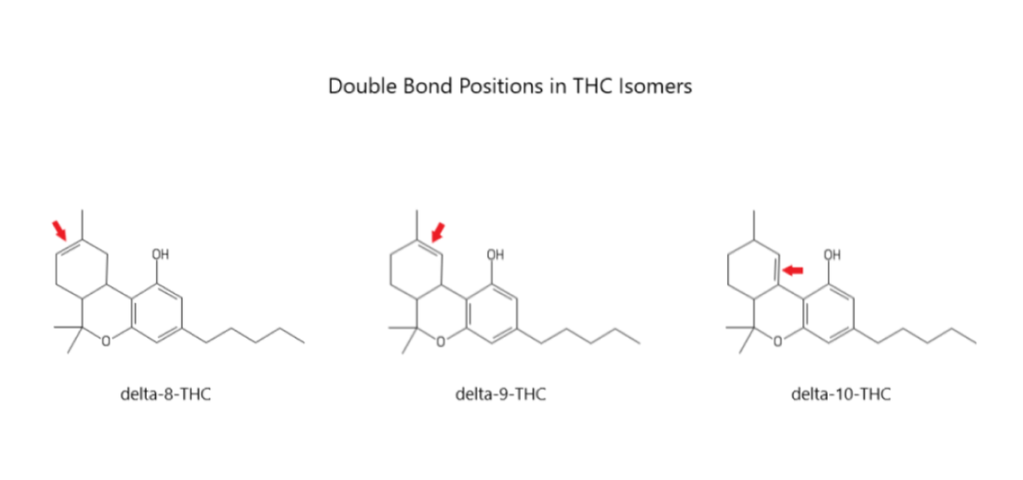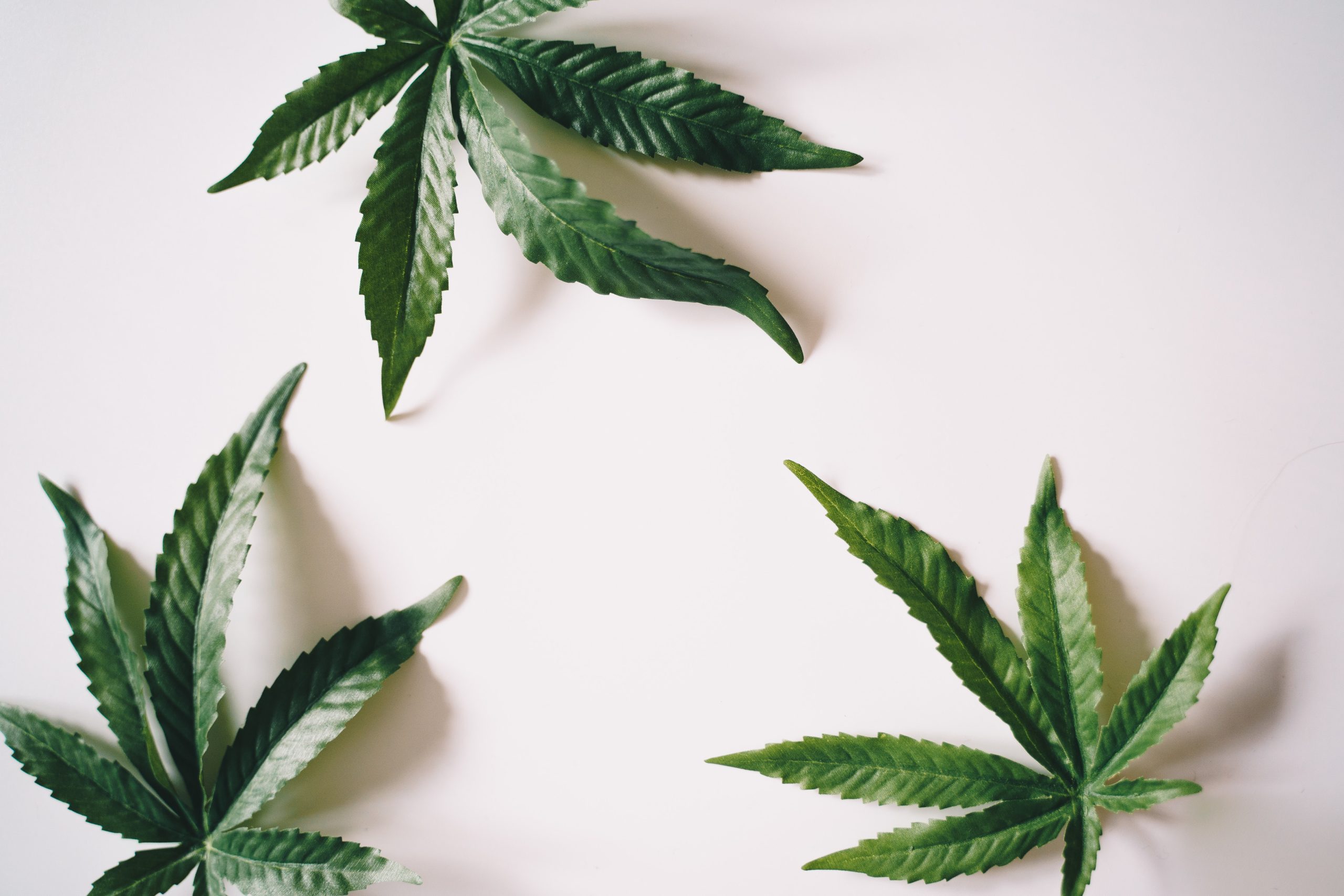Your cart is currently empty!
June 2nd, 2021

Most of us know that tetrahydrocannabinol (THC) is the compound of cannabis that gets us high. However, it might be time to look past the association with intoxication pertaining to THC, and take a closer inspection at its properties, as this compound is a cannabinoid, offering distinctive effects to the body’s endocannabinoid system in an effort to aid in homeostasis.
While for decades we were only really familiar with delta 9 THC, the dominant compound in the marijuana plant, the ever-growing hemp market has introduced us to two alternative forms of THC – first, delta 8, and very recently, delta 10. Naturally, those who are relatively new to the cannabis scene might be confused by these three compounds based on both their similarities and differences.
First, we want to explain why THC compounds can be more useful than their psychoactive status, especially when taken in the long term. Delta 8, delta 9, and delta 10 are all cannabinoids, like cannabidiol (CBD), the more common cannabis compound on the market which comes from the hemp plant. Cannabinoids are unique because they are the only compounds in nature that directly interact with the endocannabinoid system, a complex system found in the body of every mammal.
The endocannabinoid system is a network of cannabinoid receptors that are found in every system of the body. Every cannabinoid receptor is assigned a bodily process, whether it be pain receptor sensitivity, anti-inflammatory response, mood, appetite, and so on. Cannabinoid receptors regulate their assigned processes in a way that contributes to balance and equilibrium throughout the body, which is known as homeostasis, and basically reflects maximum functionality of the body and mind.
For cannabinoid receptors to effectively regulate these processes of the body, they must be given cannabinoids. And, each cannabinoid in cannabis binds to specific cannabinoid receptors to trigger individual responses that play a role in how we feel.
What this means is that taking a variety of cannabinoids each day may offer the most widespread effects throughout the body. Therefore, you can understand why delta 8, delta 9, and delta 10 can all be more valuable than the temporary high that they’re most known for.
There are two categories of cannabinoid receptors in the body:
Some cannabinoids work on both of these types of receptors, while others choose to focus all of their attention on one category. This has a lot to do with the distinctive properties that individual cannabinoids are associated with.
Delta 8 is a cannabinoid that’s been on the market for about a year now. However, that doesn’t mean that it’s “new.” Delta-8 has always existed in the hemp plant, being a byproduct of the natural aging process of delta 9 THC, meaning that delta 9 is converted into delta 8 as it breaks down through a natural process.
The delta 8 on today’s market is derived from the hemp plant in order to be compliant with federal law. There is only about 0.1% delta 8 in hemp, meaning that we would not be able to feel its effects by taking the plant’s chemical composition as a whole. Thus, the delta8 products that are available for purchase contain a concentrated form of this cannabinoid instead.
Delta 8 isn’t “made,” because it already exists in nature. But, the concentrate that is found in delta 8 formulas that we can purchase is made through the same steam distillation process used to isolate delta 9 THC. Due to the low prominence of delta 8 in the hemp plant, this is the most efficient method for rendering a delta 8 extract with enough potency to offer the compound’s effects in a noticeable way.
Delta 8 THC is, in fact, a federally legal compound, even in its concentrated form, as long as it comes from the hemp plant, which again, all commercially available delta 8 does. This is because the federal law is clear that all hemp products and derivatives are legal as long as they contain no more than 0.3% delta 9 THC – the law says nothing about other forms of THC whatsoever.
Still, delta 8 has been banned in 11 states:
As long as you don’t live in one of these states listed above, you can legally purchase delta 8 in a variety of forms and concentrations without risk of legal repercussion.
Perhaps the biggest appeal of delta 8 is that it offers a milder high than delta 9, providing more of a buzz than a full-blown intoxicating experience. In other words, delta-8 is less likely to impair functionality than delta 9, and many say they feel more clear-minded when taking delta 8 than delta 9. The high is also associated with notable mood effects that are mainly calming.
Experts say that delta 8 is about 70% as intoxicating as delta 9. Of course, taking an unusually high dose of delta-8 could still cause feelings of anxiety, low blood pressure and other side effects associated with taking too much delta-9, especially if a person is a beginner.
Ultimately, how potent the intoxicating effects of delta 8 are depends on each individual’s tolerance, which is determined both by prior exposure to THC and a person’s unique endocannabinoid system, as some are simply more sensitive to these effects than others. Overall, however, the majority of users will notice a “buzz” and a more relaxed feeling, and perhaps some mild sleepiness as well.
As delta 8 is fairly new to the scene compared to delta 9, there are fewer overall studies done on its effects. But, early studies indicate lots of potential for offering relief from pain, anti-anxiety properties, neuroprotective properties, relief from nausea, and help with sleep.
Delta 9 is the dominant cannabinoid of the marijuana plant, and easily the most known of the three forms of THC we will be discussing today. The marijuana plant can have 15 to 30% THC in its chemical composition, while the hemp plant only has 0.3%, which is such a low level that using hemp cannot get you high, even if taken in a particularly large amount at one time.
Delta 9 is so abundant in the marijuana plant that most people simply use the raw plant material when they seek out delta 9 THC. In other words, making a delta 9 concentrate or extract is less common than producing a delta 8 or delta 10 concentrate or extract. However, delta 9 concentrates and extracts do exist, and these are usually produced using a distillation process that isolates the compound through exposing the full chemical composition of the plant to steam which gradually removes the unwanted compounds until a pure form of delta 9 remains.
Let’s cut to the chase. Any product containing more than 0.3% delta 9 THC is federally illegal. This means that the marijuana plant in its natural state is illegal, as are products containing concentrations of the compound above 0.3%. Hemp products on the market are legal because the plant only contains 0.3% delta 9, as opposed to marijuana with its far higher concentration that naturally occurs.
Of course, we also know that in several states across the country, marijuana is legal, as state law can override federal law on this matter. Therefore, if you do live in a state in which marijuana is legal, you can buy marijuana and experience a potent dose of delta 9 THC.
Delta 9 is by far the most psychoactive compound present in the entire cannabis genus. After all, its high is so potent that it’s the reason why marijuana remains a federally illegal substance. But, like most psychoactive compounds and substances, users may build a tolerance to these intoxicating effects over time, meaning that the high becomes less potent as usage progresses.
After consuming delta 9 in any form, users can expect to feel a particularly powerful high in which their state of consciousness is noticeably altered. Unlike the other THC compounds we will be discussing, delta 9 can truly interfere with mental clarity and abilities to perform basic tasks, if taken in a higher dose or if taken by an individual with a low tolerance. Delta 9 THC also has unique effects on mood, often delivering both a sense of euphoria and calm, and may make a person feel sleepy.
Taking a higher than necessary dose of delta 9 could lead to:
These effects are temporary, and wear off once the high is no longer active.
Like we said, THC cannabinoids can offer more than a high, because as cannabinoids, they may aid in the process of regulating functions of the body in a more long-term way. Delta 9 THC, out of all of the compounds we are discussing today, has the most research behind it as it has been on the market for a longer period of time.
Among other things, studies show that delta 9 may help with:
Finally, we come to delta 10 THC, which is essentially a brand-new cannabinoid that was only discovered very recently and has only been on the market for a few weeks. Delta 10 is incredibly unique from the other two forms of THC in that it doesn’t actually occur naturally in cannabis.
Delta 10 was discovered by accident, in fact. In the past year, an existing cannabis farm in California was purchased by a new team of cultivators. They decided to have the cannabis growing on the land tested to find out about its chemical composition. They noticed that there was crystallization occurring in the compound structure, which was the result of the plant being exposed to a fire retardant during the tragic wildfires that claimed a lot of farmland in recent times. Upon closer inspection, it was determined that this unique crystallization process resulted in the development of delta 10, a never-before-seen cannabinoid.
Rest assured that the delta 10 that is now emerging on the market has not been produced by exposing the plant to fire retardant. In fact, once delta 10 was discovered, it was quickly determined that delta 10 is simply an isomer of cannabidiol. What this means is that the two compounds have the same molecular makeup, but a different molecular arrangement.
In other words, rearranging the molecules of CBD produces delta 10, which, due to its unique arrangement, offers different properties and characteristics altogether.
Delta 10 essentially has the exact same legal status as delta 8. As long as it’s made from the hemp plant and not the marijuana plant, it’s fully legal under federal law. And it’s illegal in the same 11 states that have banned delta 8 THC, which are:
Like delta 8, delta 10 is said to be about 70% as intoxicating as delta 9 THC. But, it’s high is different from delta 8, as we will explain in the next section. Delta 10, like delta 8, could potentially cause anxiety and grogginess if taken in a dose that’s too high, especially if you’re a beginner, but this is less common than it is with delta 9 THC.
The high of delta 10 is quite distinctive, according to those who have already taken it as it’s only recently become commercially available. While delta 8 is known for offering a more calming type of high, delta 10 seems to do the opposite, providing stronger uplifting effects, more of a mild energy boost and increased creativity and focus.
Here is the thing, delta 10 is so new that no studies have been done on its effects yet. Therefore, we cannot say what its properties are because these have yet to be confirmed by researchers. But, as a cannabinoid, delta 10 offers various properties throughout the body through interaction with cannabinoid receptors. In the coming months and years, studies will be performed to examine the properties of this cannabinoid.
Given the energizing and uplifting properties people are describing, it is likely that delta 10 can be useful when you are feeling fatigued, unable to concentrate or experiencing a low mood.
Like we said, all three cannabinoids interact with the endocannabinoid system, and therefore play some role in the body’s ability to manage homeostasis. The three cannabinoids do, however, work on different cannabinoid receptors, as each cannabinoid is distinctive in this way.
No matter which compound(s) you go with, you will experience a high when taking it, as all three compounds are psychoactive.
All three cannabinoids put you at risk of failing a drug test, because all three are metabolized by an enzyme called THC-COOH. It’s this enzyme, and not THC itself, that is identified in a standard urine test. Likely, delta 8 and delta 10 render lower levels of THC-COOH, being milder, but they still put you at enough risk to make them worth avoiding if you will be tested in the near future.
Further, all three cannabinoids will likely offer some sort of desirable effect on your mood, as all three are associated with mood-balancing properties that go hand in hand with the high they produce.
Now that you know what each of these cannabinoids can offer, you can have a better understanding of which one likely aligns with your goals and preferences the most. Of course, unless you live in a state in which marijuana is fully legal, you can only lawfully choose between delta 8 and delta 10. However, even these two cannabinoids are so distinctive in their effects that they are equally worth exploring.




How would you like to shop?